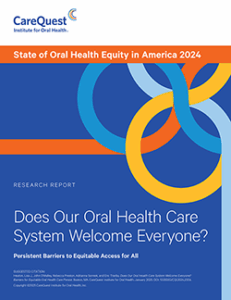Persistent Barriers to Equitable Access for All
Barriers to adequate oral health care for millions of people in the US — barriers stemming from socioeconomic factors and environments that do not welcome everyone — continue to create inequities, according to CareQuest Institute’s fourth annual State of Oral Health Equity in America (SOHEA) survey.
The State of Oral Health Equity in America is the largest nationally representative survey about oral health with participation from more than 9,000 adults in the US.
Key findings include:
- Just under one third of adults surveyed (32%) say they have not visited a dentist in the prior year, and 16% of adults do not plan to see a dentist in the coming year for routine or preventive care. Cost is the top reason for not planning a future dental visit.
- One quarter of adults — 69 million people — report that they do not have any type of dental insurance. Those with a disability are least likely to have dental insurance.
- Nearly half of adults say it is important to them that their dental office has a diverse workforce and that a dentist embraces their cultural preferences.
- Adults identifying their race as Black (9%), two or more races (9%), or “other” (8%) were at least twice as likely to report experiencing discrimination in an oral health care setting as adults identifying as Hispanic (4%), white (3%), or Asian (1%).
You may also be interested in:
- Social Determinants of Health Linked with Oral Health, a journal article that analyzes the impact of various social determinants on oral health outcomes.
- Integration and Coordination to Improve the Patient Experience, a self-paced, online course that explores care coordination and integrated care to support whole-person health. Eligible for one free CE credit.
- State of Oral Health Equity in America, a series of reports that highlight key findings and insights from previous annual surveys.

